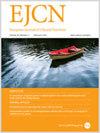预测对糖尿病前期生活方式干预无反应者:一种机器学习方法。
IF 3.6
3区 医学
Q2 NUTRITION & DIETETICS
引用次数: 0
摘要
背景:糖尿病前期患者的临床治疗过程始于生活方式干预,由于一线干预的成功率较低,通常会升级到更密集的治疗。临床医生缺乏明确的指导原则,不知道哪些患者可以从早期治疗中获益,从而选择更密集的治疗方案,因此我们旨在开发一种算法,以早期识别对生活方式干预无反应的糖尿病前期患者:方法:我们筛选了几种统计和机器学习算法,并进行了内部交叉验证,以确定其准确性和鉴别能力:结果:在众多筛选出的算法中,只有随机森林模型的准确率足以超过本中心患者的历史失败率,准确率为 0.689 (CI 0.669, 0.710),AUROC 为 0.687 (CI 0.673, 0.701):这项研究展示了机器学习模型在临床实践中利用常规收集数据中的知识提供有用见解的能力。本文章由计算机程序翻译,如有差异,请以英文原文为准。

Predicting non-responders to lifestyle intervention in prediabetes: a machine learning approach
The clinical care process for people with prediabetes starts with lifestyle intervention, often escalating to more intense treatment due to the low success rate of the first-line intervention. Clinicians lack clear guidelines on which patients would benefit from early treatment with more intensive therapeutic options, so we aimed to develop an algorithm to early identify non-responders to lifestyle intervention for prediabetes. Several statistical and machine learning algorithms were screened with internal cross-validation on the basis of accuracy and discrimination ability to correctly classify patients that would fail to normalize fasting glycemia within one year of being prescribed a lifestyle intervention, solely based on the first examination measurements. Of the many screened algorithm, only a random forest model performed with sufficient accuracy to exceed the historical failure rate of patients within our center, with an accuracy of 0.689 (CI 0.669, 0.710) and an AUROC of 0.687 (CI 0.673, 0.701). This study showcases the ability of machine learning models to provide useful insight in clinical practice leveraging knowledge contained in routinely collected data.
求助全文
通过发布文献求助,成功后即可免费获取论文全文。
去求助
来源期刊
CiteScore
10.60
自引率
2.10%
发文量
189
审稿时长
3-6 weeks
期刊介绍:
The European Journal of Clinical Nutrition (EJCN) is an international, peer-reviewed journal covering all aspects of human and clinical nutrition. The journal welcomes original research, reviews, case reports and brief communications based on clinical, metabolic and epidemiological studies that describe methodologies, mechanisms, associations and benefits of nutritional interventions for clinical disease and health promotion.
Topics of interest include but are not limited to:
Nutrition and Health (including climate and ecological aspects)
Metabolism & Metabolomics
Genomics and personalized strategies in nutrition
Nutrition during the early life cycle
Health issues and nutrition in the elderly
Phenotyping in clinical nutrition
Nutrition in acute and chronic diseases
The double burden of ''malnutrition'': Under-nutrition and Obesity
Prevention of Non Communicable Diseases (NCD)

 求助内容:
求助内容: 应助结果提醒方式:
应助结果提醒方式:


